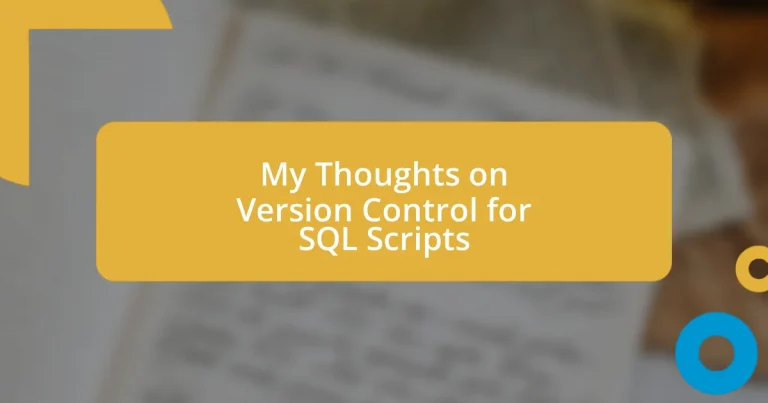Key takeaways:
- Version control is essential for managing SQL scripts, allowing for easy tracking of changes, reversion to previous states, and minimizing chaos in collaborative environments.
- Choosing the right version control system involves considering factors like user interface, collaboration features, and compatibility with existing tools to avoid issues and enhance productivity.
- Emphasizing best practices, such as clear documentation, consistent naming conventions, and regular backups, is crucial for minimizing confusion and protecting project integrity in SQL development.
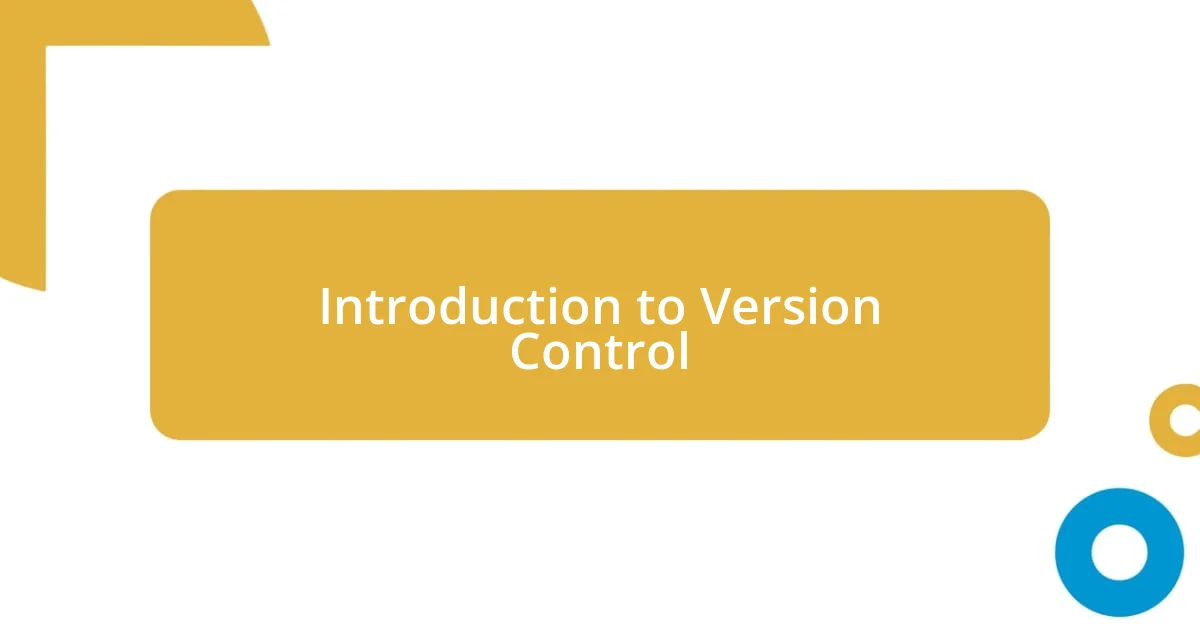
Introduction to Version Control
Version control is a powerful practice that many developers have come to love, and for good reason. I remember when I first started using version control; it felt like I had finally found a reliable safety net. How comforting is it to know that you can track every change you make, allowing you to revert back to previous states if something goes wrong?
Many might wonder why it’s particularly essential for SQL scripts. I can’t emphasize enough the chaos that can ensue when multiple people are editing database scripts. When I realized that one small oversight could lead to data loss or corruption, I understood the need for a system that not only keeps track of modifications but also helps in collaboration, minimizing the potential for chaos.
Moreover, embracing version control can feel like gaining control over a vast, intricate system. Like the time I accidentally deployed an erroneous change to a production database. That sinking feeling in my stomach taught me that having a history of every script version is not just beneficial; it’s a lifesaver. Imagine moving forward in your projects with the confidence that every twist and turn is documented and can be revisited. It’s a game-changer!
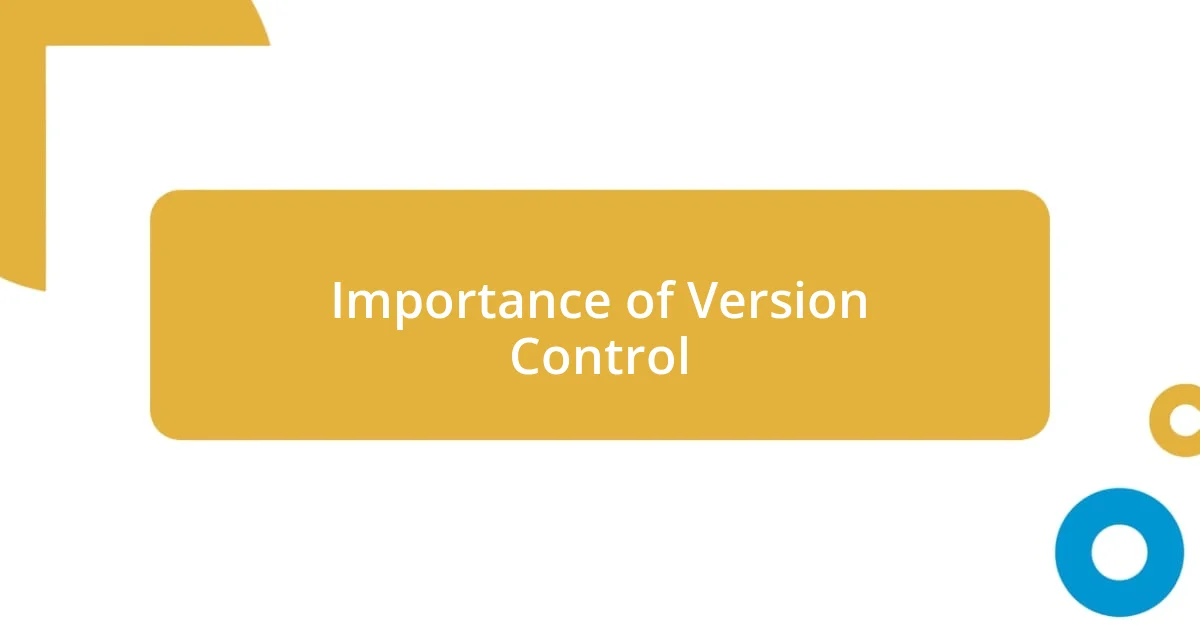
Importance of Version Control
Version control isn’t just about keeping a tidy history of changes; it’s a lifeline in the often unpredictable world of SQL development. I recall a specific instance where an alteration I made inadvertently disrupted a crucial feature in the application. Fortunately, I could roll back to the earlier version, restoring functionality almost immediately. This experience highlighted the importance of having a reliable version control system in place—not only does it protect your work, but it also gives you peace of mind.
Another reason I value version control is the way it facilitates team collaboration. In one project, I was part of a large team where multiple developers contributed to the same database. Without version control, merging changes would have been a nightmare and could have introduced inconsistencies. Having a structured way to manage our scripts helped us communicate better, avoid overlaps, and maintain a coherent development process. It transformed our chaotic workflow into a seamless collaboration.
Ultimately, version control shines as a best practice for professionals handling SQL scripts, transforming potential headaches into manageable tasks. I think back to scenarios where, without tracking changes, I’d have been lost, moving through trial and error endlessly. That certainty provided by version control genuinely elevates the way we work, ensuring that every step we take is intentional and documented.
| Aspect | Importance of Version Control |
|---|---|
| Change Tracking | Allows reversion to previous states, protecting against errors |
| Collaboration | Enables multiple developers to work together effectively |
| Documentation | Maintains a clear history of changes for transparency |
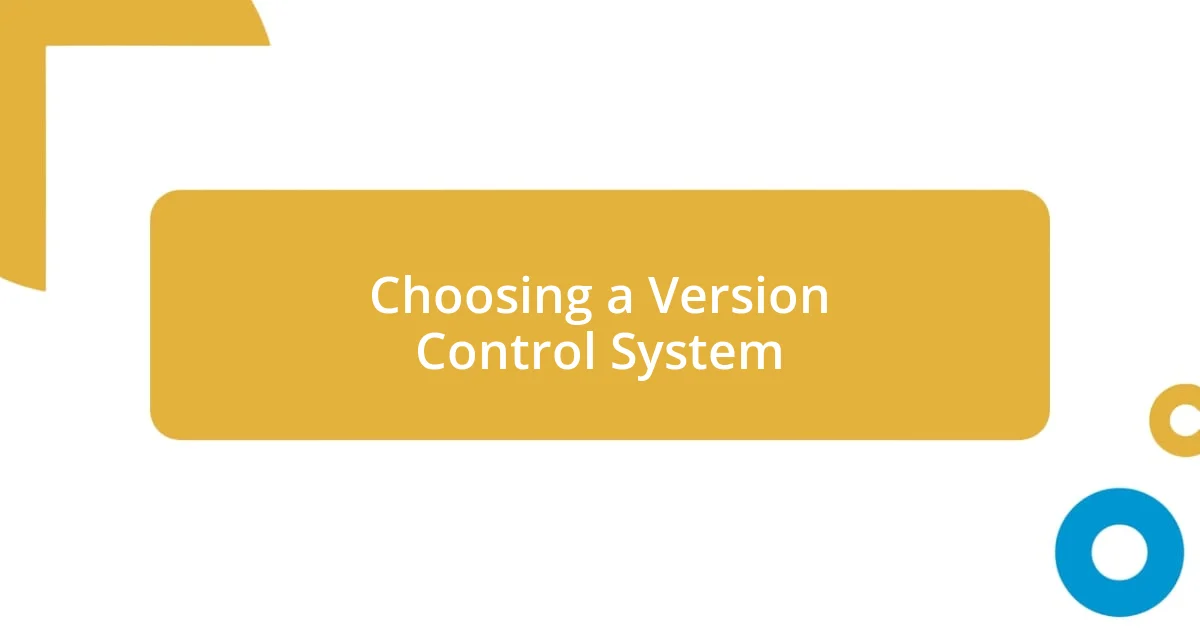
Choosing a Version Control System
Choosing a version control system can feel overwhelming, especially with so many options available. I remember feeling almost paralyzed by choice when I first started; it’s like being faced with a menu full of tempting dishes. You want to ensure that the system aligns with your needs and those of your team. Essential factors to consider include the ease of use, support for branching and merging, and integration with other tools you might already use.
Here are some vital points to ponder when selecting your version control system:
- User-Friendly Interface: A system that’s intuitive can save you time and frustration, especially when you’re under pressure.
- Branching and Merging: Look for a tool that supports these features, allowing you to experiment without affecting the main branch.
- Collaboration Features: Ensure it facilitates teamwork, whether that’s through comments, code reviews, or easy access to previous versions.
- Compatibility and Integrations: Check if it integrates smoothly with other tools you’re using, such as CI/CD pipelines or project management software.
- Community Support: A strong community can guide you through any hiccups, offering tips, documentation, and troubleshooting.
It’s crucial to evaluate these aspects based on personal and team experiences. I sometimes reflect on a time when I chose a system hastily, only to face compatibility issues that delayed our project. A thoughtful choice truly makes a difference, letting you focus on what really matters—your code.
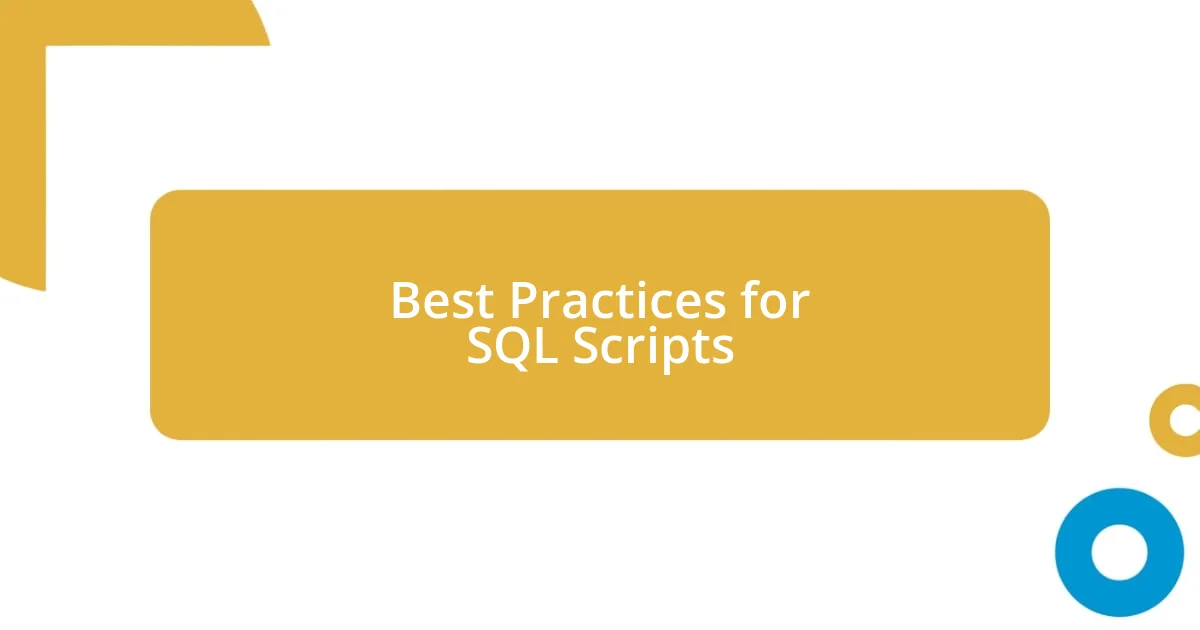
Best Practices for SQL Scripts
When working with SQL scripts, it’s essential to maintain clarity and consistency in your code. One practice I always follow is using comments liberally, especially for complex logic or important changes. I’ve found that taking a moment to annotate my scripts not only helps others understand my intentions but also aids my future self when revisiting a project after a while. Did you ever dive back into your code, only to wonder what you were thinking? A good comment can prevent that sinking feeling.
Proper naming conventions also play a critical role in keeping SQL scripts organized. I remember a project where inconsistent naming led to confusion, with colleagues struggling to figure out which script did what. By adopting a standard, such as prefixing scripts with their function or functionality, we drastically improved our workflow. It made it feel like we were all on the same page, reducing unnecessary frustration and enhancing collaboration.
Finally, never overlook the importance of regular backups. I once worked on a significant database migration where a minor hiccup caused data loss. Thankfully, we had an automated backup system in place, allowing us to restore everything in minutes. This experience solidified my belief that investing in a reliable backup solution is non-negotiable—after all, protecting your hard work should always be a top priority. Have you considered how often you back up your scripts? I know I take backup frequency more seriously now.
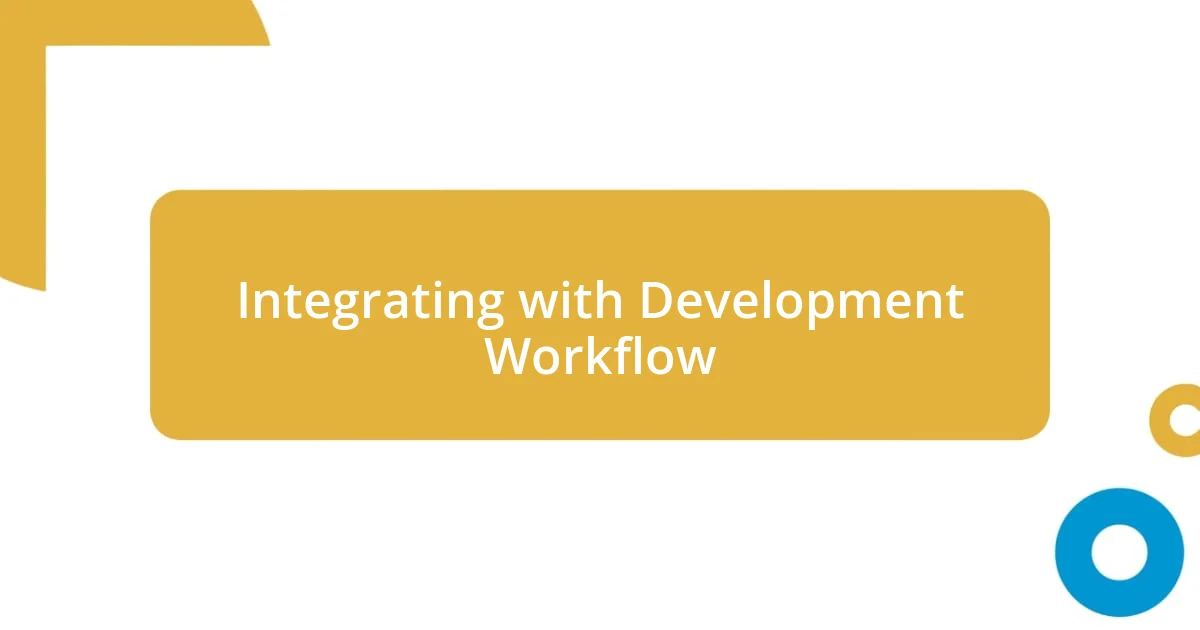
Integrating with Development Workflow
Establishing a version control system that integrates seamlessly into your development workflow can revolutionize how your team collaborates on SQL scripts. I vividly recall a time when our team transitioned to Git, and it transformed our project dynamics. Suddenly, developers were not just coding in isolation; they were sharing, reviewing, and iterating on each other’s work in real-time, fostering a sense of camaraderie that had been missing before.
One critical aspect I’ve learned is the timing of commits. In my experience, I found that committing changes at logical milestones—not just when something is broken—encourages a narrative of progress. It’s like telling a story; each commit is a chapter that reflects the development journey. I often ask myself, “Does this commit convey the intention behind my changes?” When it does, it creates a clearer history for everyone involved, making future debugging and enhancements a smoother ride.
Moreover, integrating your version control with tools like CI/CD pipelines can save you a world of headaches. I remember implementing automated testing after a colleague’s blunder led to a production mishap. Now, whenever my SQL scripts are pushed, they are automatically tested. This not only builds confidence in our releases but also gives everyone a touchpoint to breathe easy, knowing that potential issues will be caught before they escalate. Have you explored how automation might offer you the same peace of mind?
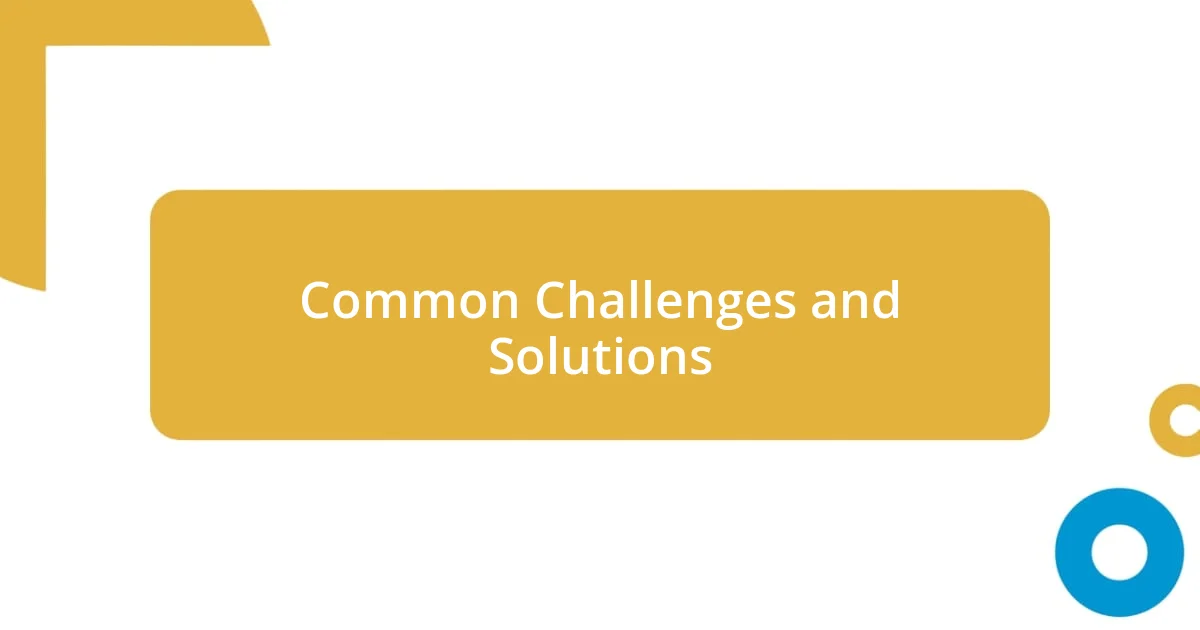
Common Challenges and Solutions
One of the most common challenges I’ve encountered with version control for SQL scripts is dealing with merge conflicts. I still remember the frustration of two developers changing the same script at the same time—what a headache! To tackle this, I’ve learned to encourage open communication within the team. When we set clear boundaries for who is working on which scripts, it dramatically reduces the chances of conflicts. Isn’t it far more satisfying to collaborate smoothly rather than dragging our feet through conflict resolution?
Another hurdle is ensuring that everyone is on the same page regarding environment setup. I once found myself knee-deep in a project, wrestling with discrepancies between my local setup and production. It was a mess! To prevent that chaos, I now advocate for using containerization tools like Docker. By creating a uniform environment, we can ensure that SQL scripts run the same way across the board, minimizing those pesky environment-related issues. How often have you wished for a magic button to fix environment discrepancies?
Lastly, tracking the history of script changes can become overwhelming without proper documentation. I’ve had my moments of deep regret after realizing that critical changes were not logged, leading to confusion about why certain decisions were made. To address this, I suggest establishing a clear set of guidelines for documentation alongside version control practices. Keeping a concise log of changes with context helps everyone on the team stay informed. It’s amazing how a simple practice can bring much-needed clarity, don’t you think?
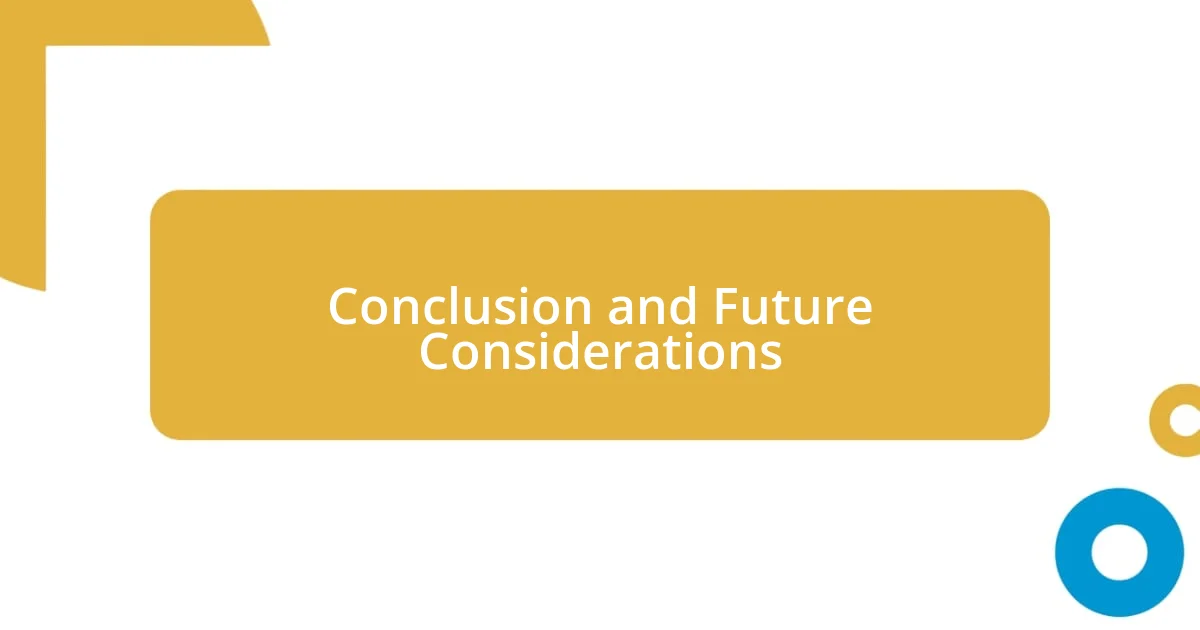
Conclusion and Future Considerations
The future of version control for SQL scripts holds immense promise as organizations increasingly recognize its value. I recall attending a conference where a speaker emphasized the importance of embracing cloud-based version control systems. This shift not only improves accessibility but also enhances collaboration among remote teams. Isn’t it exhilarating to think about how technology can bridge the gap between developers scattered across different locations while maintaining a united front in project management?
Looking ahead, one area for consideration is the integration of artificial intelligence in version control workflows. I’ve seen early adopters leverage AI tools to identify patterns in code changes, offering suggestions that help streamline the development process. Imagine a scenario where your version control system not only tracks changes but also actively guides you towards best practices. Doesn’t this sound like a game-changer for maintaining SQL scripts?
Finally, as we adapt to these evolving technologies, the emphasis on training and fostering a culture of continuous learning cannot be overstated. I remember the days when our team struggled with adopting new tools due to a lack of understanding. By prioritizing comprehensive training programs, we can empower everyone to make the most of version control systems. How often do we overlook the role of knowledge in driving successful implementation? By investing in our team’s growth, we’re setting the stage for smoother collaborations and better project outcomes.












